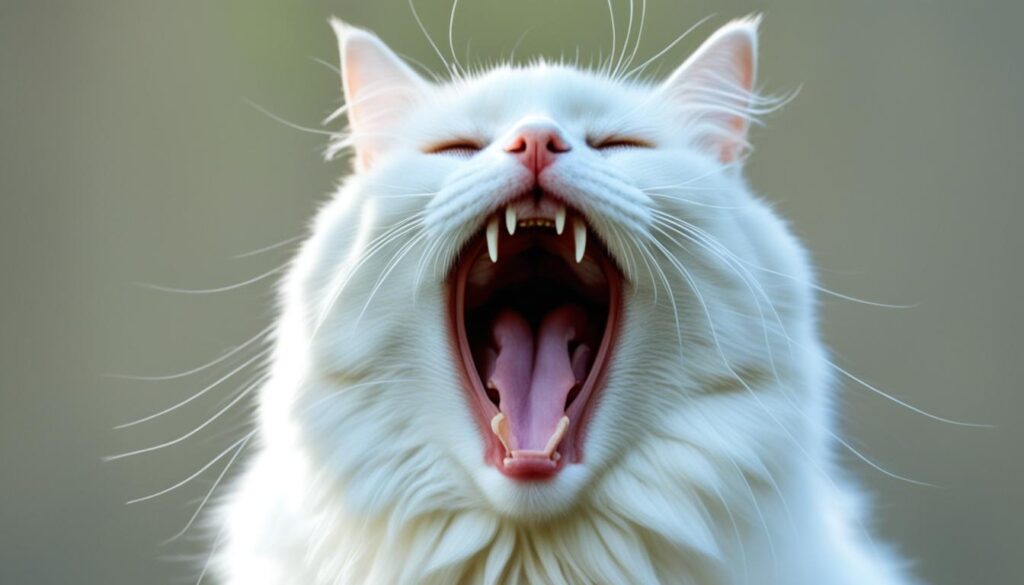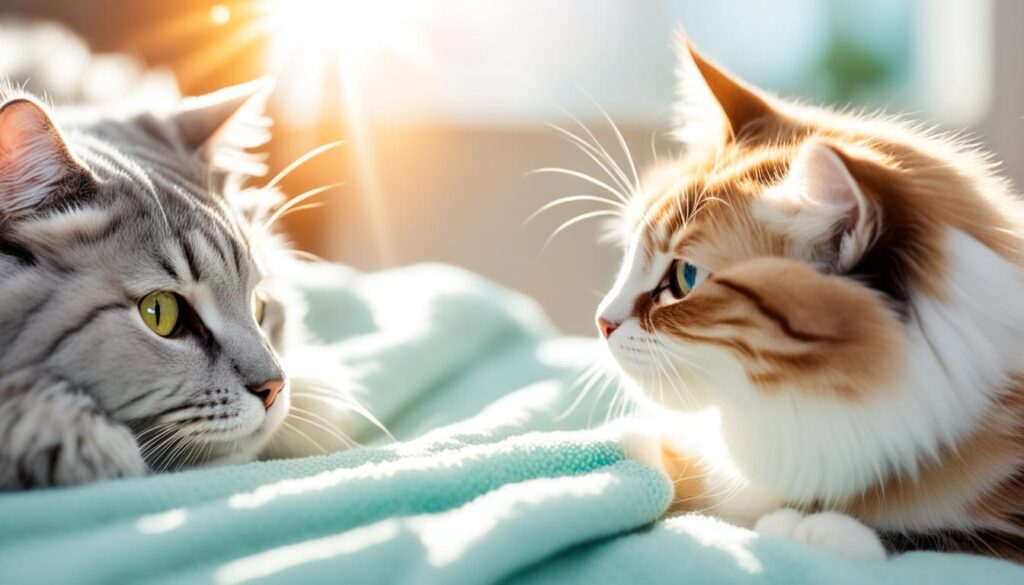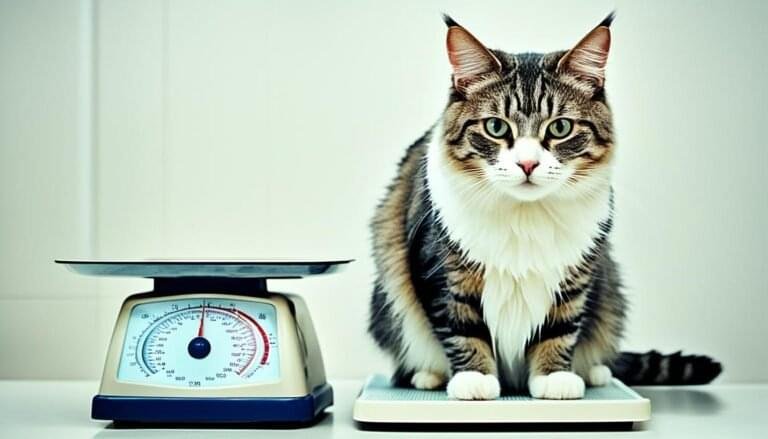Did you know that heavy breathing in cats can be a sign of a serious health issue? It’s not something to take lightly. When a cat is struggling to catch its breath, it could indicate an underlying problem that requires immediate attention. As a responsible cat owner, it’s crucial to be aware of the reasons behind cat breathing heavy and take appropriate action to ensure your furry friend’s well-being.
Heavy breathing in cats is a concerning symptom that should not be ignored. Whether your cat is panting, wheezing, or experiencing rapid and shallow breathing, it is important to understand the potential causes and seek veterinary care as soon as possible. In this article, I will guide you through the various reasons behind heavy breathing in cats, the associated symptoms, when to seek veterinary care, and the available treatment options.
Key Takeaways:
- Heavy breathing in cats can indicate a serious health issue and should not be ignored.
- There are various potential causes of heavy breathing in cats, including respiratory infections, asthma, heartworm, and more.
- Recognizing the symptoms of heavy breathing, such as panting, wheezing, and increased respiratory rate, is essential for prompt veterinary care.
- If your cat is breathing heavily without an apparent reason, immediate veterinary attention is necessary.
- Treatment options for heavy breathing in cats depend on the underlying cause and may include medications, fluid drainage, and supportive care.
Normal Panting in Cats
While panting is more commonly associated with dogs, it is not entirely unusual for cats to pant in certain situations. Understanding when panting is considered normal in cats can help alleviate any concerns you may have about your feline friend’s respiratory health.
Cat panting can occur when they are:
- Overheated: Cats regulate their body temperature through panting when they are too warm.
- Anxious: Panting can be a response to stress or anxiety in cats.
- Engaged in Strenuous Exercise: Cats may pant after particularly vigorous play or exercise.
It’s important to note that panting is much less common in cats compared to dogs. If your cat is panting excessively or in abnormal situations, it may be a sign of an underlying health issue and should be evaluated by a veterinarian.
When in doubt about the cause of your cat’s panting, consulting a veterinarian is always the best course of action.
| Situation | Explanation |
|---|---|
| Overheated | Cats pant to cool down when they are too warm. |
| Anxious | Stress or anxiety can lead to panting in cats. |
| Strenuous Exercise | Panting after intense play or exercise is normal for cats. |
Abnormal Breathing in Cats
When it comes to our feline companions, labored breathing, also known as dyspnea, should never be taken lightly. This abnormal breathing pattern can be a clear indication of a serious underlying medical issue.
If you notice your cat experiencing heavy or labored breathing without any apparent reason such as overheating or exercise, it is crucial to seek emergency veterinary care immediately. Delaying treatment can worsen your cat’s condition and increase the risk of complications.
There are several potential causes of abnormal breathing in cats. Some common conditions include:
- Asthma: This respiratory condition is characterized by inflammation and constriction of the airways, leading to breathing difficulties.
- Heartworm: These parasites can invade the heart and lungs, causing respiratory distress.
- Respiratory infections: Bacterial, viral, or fungal infections can affect the respiratory system and lead to breathing problems.
- Other underlying health problems: Various conditions, such as congestive heart failure or anemia, can impact a cat’s respiratory function.
To further understand the underlying cause of your cat’s abnormal breathing, a veterinarian will conduct a thorough examination and may recommend diagnostic tests, including blood work, chest x-rays, and ultrasounds. These tests can help identify the specific condition and guide the appropriate treatment plan.
Remember, prompt veterinary care is crucial when it comes to your cat’s respiratory distress. Taking immediate action can potentially save their life and improve their overall well-being.
| Cause | Description |
|---|---|
| Asthma | Inflammation and constriction of the airways, leading to breathing difficulties |
| Heartworm | Parasites invading the heart and lungs, causing respiratory distress |
| Respiratory infections | Bacterial, viral, or fungal infections affecting the respiratory system |
| Other underlying health problems | Conditions such as congestive heart failure or anemia impacting respiratory function |
Causes of Heavy Breathing in Cats
When it comes to heavy breathing in cats, there are several potential causes that pet owners should be aware of. Identifying the underlying cause is crucial in providing the necessary treatment and care for your furry friend.
Some of the common causes of heavy breathing in cats include:
- Asthma: Similar to humans, cats can develop asthma, which can cause wheezing and difficulty breathing.
- Heartworm: A parasitic infection can lead to respiratory distress in cats, causing them to gasp for air.
- Congestive Heart Failure: A weakened heart can lead to fluid build-up in the lungs, resulting in heavy breathing.
- Respiratory Infections: Infections, such as pneumonia or bronchitis, can cause wheezing and labored breathing in cats.
- Anemia: A decrease in red blood cells can affect the oxygen-carrying capacity of the blood, leading to heavy breathing.
- Neurologic Disorders: Conditions affecting the nervous system can disrupt normal breathing patterns in cats.
- Trauma: Chest injuries or trauma to the respiratory system can cause heavy breathing and gasping for air.
- Abdominal Enlargement: An enlarged abdomen, due to fluid accumulation or tumors, can put pressure on the diaphragm, making it difficult for cats to breathe.
- Pain: Cats experiencing pain, such as from an injury or underlying condition, may exhibit heavy breathing as a response.
It’s important to note that heavy breathing in cats can be a sign of a serious health problem. If your cat is exhibiting wheezing or gasping for air, it’s crucial to consult a veterinarian for a proper diagnosis and appropriate treatment.
Symptoms of Heavy Breathing in Cats

Different types of heavy breathing in cats can manifest in various ways. It’s important to pay attention to these symptoms as they can be indicators of underlying health issues. If you notice any abnormalities in your cat’s breathing, it is crucial to seek veterinary attention to ensure their well-being. Some common symptoms of heavy breathing in cats include:
- Panting
- Wheezing
- Coughing
- Increased respiratory rate
- Deep and rapid breathing
- Nasal congestion
- Shallow breathing
If you observe any of these symptoms in your cat, it is recommended to consult a veterinarian as soon as possible. Rapid breathing in cats and cat respiratory distress should not be taken lightly, as it could indicate a serious underlying condition that requires medical attention.
When visiting the vet, make sure to provide detailed information about your cat’s symptoms and behavior. This will assist the veterinarian in making an accurate diagnosis and developing an appropriate treatment plan. Early intervention is key to ensuring the best possible outcome for your cat’s respiratory health.
Now let’s take a closer look at when to seek veterinary care for heavy breathing in cats and the diagnostic tests used to identify the underlying cause.
| Symptoms | Description |
|---|---|
| Panting | Open-mouthed breathing with rapid inhalation and exhalation |
| Wheezing | High-pitched, whistling sound during breathing |
| Coughing | Repetitive hacking or coughing sounds |
| Increased respiratory rate | Breathing faster than the normal range |
| Deep and rapid breathing | Forceful, quick inhalation and exhalation |
| Nasal congestion | Stuffy or blocked nose |
| Shallow breathing | Reduced depth of inhalation and exhalation |
Example Case Study: Fluffy’s Symptoms
Let’s explore an example case study to understand how the symptoms of heavy breathing in cats can present in real-life situations. Meet Fluffy, a 5-year-old domestic shorthair cat, who came to the veterinarian with the following symptoms:
- Intermittent episodes of panting
- Occasional wheezing sounds during breathing
- Increased respiratory rate during physical activity
Upon further examination, the veterinarian discovered that Fluffy had developed feline asthma, a common respiratory condition in cats. This diagnosis was confirmed through diagnostic tests such as chest x-rays and pulmonary function tests. Fluffy was prescribed medication to manage her asthma and advised to avoid potential triggers such as dust and strong odors.
Through early detection and appropriate treatment, Fluffy’s respiratory health improved, and her heavy breathing episodes became less frequent. Regular follow-up appointments ensured that Fluffy’s condition was properly managed, leading to a better quality of life.
Understanding the symptoms of heavy breathing in cats is essential for early intervention and effective veterinary care. In the next section, we’ll discuss when to seek veterinary care for your cat’s heavy breathing and the diagnostic tests used to identify the underlying cause.
When to Seek Veterinary Care
If your cat is breathing heavily and you are concerned about their well-being, it is best to contact a veterinarian for guidance. In some cases, immediate veterinary care may be necessary, especially if your cat’s breathing is severe or accompanied by other alarming symptoms. Don’t delay seeking help if you are unsure or worried about your cat’s breathing.
When it comes to cat respiratory distress, time is of the essence. Prompt medical attention can make a significant difference in your cat’s prognosis and overall well-being. Emergency veterinary care ensures that your furry friend receives the immediate attention and treatment they need to alleviate discomfort and prevent further complications.
Heavy breathing in cats can be a sign of a serious underlying health issue that requires urgent attention. Some common red flags indicating the need for emergency veterinary care include:
- Rapid or labored breathing
- Gasping for air
- Weakness or lethargy
- Loss of appetite
- Blue or pale gums
- Open-mouth breathing
- Collapsing or fainting
If you observe any of these symptoms in your cat, it is crucial to act swiftly. Contact your veterinarian immediately and provide them with a detailed description of your cat’s symptoms. They will be able to guide you on the next steps to take.
Remember, as a cat owner, you know your feline companion best. If something feels off or your intuition tells you that your cat needs urgent care, trust your instincts and seek medical help without delay.
In cases of cat breathing heavily, it is always better to err on the side of caution and seek veterinary care promptly. Your veterinarian will be able to assess your cat’s condition, conduct diagnostic tests if necessary, and recommend the appropriate treatment plan.
Next, we will discuss the diagnostic tests that veterinarians perform to identify the causes of heavy breathing in cats.
Diagnosing Heavy Breathing in Cats
To determine the cause of heavy breathing in cats, a veterinarian will conduct a thorough physical examination, gather information about the cat’s medical history, and perform specific diagnostic tests. These diagnostic tests are essential in identifying the underlying condition and creating an appropriate treatment plan.
The diagnostic process may involve:
- Blood work: A blood test can provide valuable information about your cat’s overall health, check for any abnormalities, and detect potential infections or inflammations.
- Urinalysis: Analyzing your cat’s urine can help identify certain conditions, such as kidney problems or urinary tract infections, which may contribute to heavy breathing.
- Chest x-rays: X-rays of the chest can reveal any abnormalities or changes in the lungs, heart, or chest cavity that could be responsible for your cat’s breathing difficulties.
- Ultrasound: An ultrasound examination can provide detailed images of the internal organs, helping the veterinarian identify any structural abnormalities that might be affecting your cat’s breathing.
- Sampling of fluid or tissue: The veterinarian may collect samples of fluid or tissue from your cat’s respiratory system to analyze for infections, inflammation, or cancer cells.
By utilizing these diagnostic tests, the veterinarian can narrow down the potential causes of heavy breathing in your cat and develop an appropriate treatment plan that targets the underlying condition.
Treating Heavy Breathing in Cats
When it comes to addressing heavy breathing in cats, the treatment options will vary depending on the underlying cause. To effectively improve your cat’s respiratory health, it is crucial to follow the veterinarian’s recommendations and provide the necessary treatment.
Here are some common treatment methods for cat breathing problems:
1. Medications for Asthma Management
In cases where asthma is the cause of heavy breathing, your veterinarian may prescribe medications such as bronchodilators or corticosteroids to help manage the condition. These medications can help alleviate inflammation and open the airways, facilitating easier breathing for your cat.
2. Heartworm Treatment
If heartworm is identified as the cause of your cat’s breathing difficulties, your veterinarian may recommend specific medications or procedures to eliminate or manage the condition. Heartworm treatment aims to rid the body of heartworm parasites, which can affect the lungs and lead to respiratory distress.
3. Antibiotics for Infections
In cases where respiratory infections are present, antibiotics may be prescribed to target and eliminate the underlying bacterial cause. Treating the infection can help alleviate symptoms and improve your cat’s respiratory health.
4. Fluid Drainage for Congestive Heart Failure
If congestive heart failure is identified as the cause of heavy breathing, your veterinarian may perform procedures to drain excess fluid from the lungs or prescribe medications to manage fluid accumulation. This can help relieve the burden on the respiratory system and improve breathing.
5. Pain Management
In some cases, heavy breathing in cats may be due to pain or discomfort. Your veterinarian may prescribe pain medication or recommend other methods of pain management to alleviate discomfort and improve your cat’s breathing.
6. Supportive Care
In addition to specific treatments for the underlying cause, your cat may require supportive care to improve breathing. This may include supplemental oxygen therapy, nebulization with medication, or other supportive measures to help ease respiratory distress.
It is important to note that each cat’s treatment plan will be tailored to their specific needs and health condition. Discuss the treatment options and expectations with your veterinarian to ensure the best outcome for your furry friend.
| Treatment Options | Underlying Causes |
|---|---|
| Medications for Asthma Management | Asthma |
| Heartworm Treatment | Heartworm infection |
| Antibiotics for Infections | Respiratory infections |
| Fluid Drainage for Congestive Heart Failure | Congestive heart failure |
| Pain Management | Pain or discomfort |
| Supportive Care | General respiratory distress |
Home Care for Cats with Heavy Breathing

Once your cat has received veterinary care, there are some measures you can take at home to assist in their recovery. Caring for a cat with breathing difficulties requires creating a calm and stress-free environment that promotes their respiratory health. Here are some home remedies for cat breathing problems:
- Provide a calm and stress-free environment: Create a quiet and comfortable space for your cat, away from loud noises and sources of stress. Limit their interaction with other animals or children that may cause anxiety.
- Keep your cat indoors: Prevent exposure to outdoor allergens and pollutants that may worsen their breathing difficulties. Be mindful of open windows and doors.
- Avoid triggers: Steer clear of secondhand smoke, strong scents, and chemical irritants that can irritate your cat’s respiratory system. Use unscented cleaning products and avoid using air fresheners.
- Ensure proper temperature and humidity levels: Maintain a comfortable environment for your cat by keeping the temperature within a healthy range and providing adequate humidity. Extreme temperatures and dry air can exacerbate breathing problems.
- Administer prescribed medications or treatments: Follow your veterinarian’s instructions carefully when it comes to administering any prescribed medications or treatments. Consistency is key to effectively managing your cat’s breathing difficulties.
Monitoring your cat’s breathing and overall well-being is crucial during the recovery process. Observe any changes in their breathing patterns and seek veterinary guidance if there are any concerns or worsening symptoms.
Preventing Heavy Breathing in Cats
While not all cases of heavy breathing in cats can be prevented, there are steps you can take to minimize the risk and promote good respiratory health in your feline companion.
Regular Veterinary Check-ups
Bringing your cat to the veterinarian for routine check-ups is essential for early detection and prevention of respiratory issues. Regular examinations allow veterinarians to assess your cat’s overall health, identify any potential respiratory problems, and provide appropriate preventive measures.
Preventative Medications for Heartworm
Heartworm disease can lead to respiratory distress in cats. Administering preventative medications as recommended by your veterinarian can help protect your cat from heartworm and reduce the chance of respiratory complications.
Maintaining a Clean and Stress-free Environment
Cleanliness and a stress-free environment are key factors in maintaining your cat’s respiratory health. Regularly cleaning your cat’s living space, including litter boxes and bedding, helps minimize the presence of dust, allergens, and other respiratory irritants. Providing a calm and stress-free environment also plays a significant role in preventing respiratory distress.
Promptly Addressing Respiratory Infections and Health Issues
If your cat develops a respiratory infection or exhibits any signs of respiratory distress, such as coughing or wheezing, it is crucial to seek veterinary care promptly. Early diagnosis and treatment can prevent the progression of respiratory conditions and minimize the risk of long-term complications.
By following these preventative measures and staying vigilant about your cat’s respiratory health, you can help prevent cat respiratory distress and ensure your furry friend enjoys a healthy and comfortable life.
Conclusion
When your beloved feline companion is breathing heavily, it’s crucial not to take it lightly. Cat breathing heavy can be a sign of an underlying health issue that requires immediate attention. By understanding the potential causes, recognizing the symptoms, and seeking timely veterinary care, you can ensure the health and well-being of your cat.
Being observant of any changes in your cat’s breathing patterns is essential. If you notice your cat breathing heavily or experiencing feline heavy breathing, it’s important to consult with a veterinarian for a proper diagnosis and treatment. Your vet will conduct a thorough examination and order specific diagnostic tests to identify the underlying condition.
Your cat’s respiratory health plays a vital role in their overall wellness. By addressing heavy breathing in cats promptly, you can provide the necessary treatment and care to improve their respiratory function. Remember, always follow your veterinarian’s recommendations and administer any prescribed medications or treatments to support your cat’s recovery. Your furry friend’s well-being depends on it.
FAQ
Can cat panting be normal?
What does heavy breathing in cats indicate?
What are the causes of heavy breathing in cats?
What are the symptoms of heavy breathing in cats?
When should I seek veterinary care for my cat’s heavy breathing?
How is heavy breathing in cats diagnosed?
What are the treatment options for heavy breathing in cats?
What can I do at home to help my cat with heavy breathing?
Can heavy breathing in cats be prevented?
What should I do if my cat is breathing heavily?
References
| International Cat Association (TICA) | https://www.tica.org/ |
| The Cat Fanciers’ Association (CFA) | https://cfa.org/ |
| World Cat Federation (WCF) | https://www.wcf-online.de/ |
| Fédération Internationale Féline (FIFe) | https://www.fifeweb.org/ |







